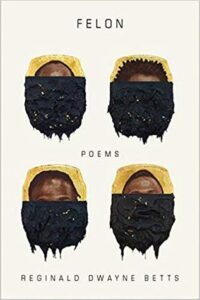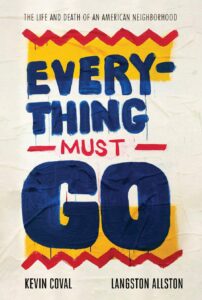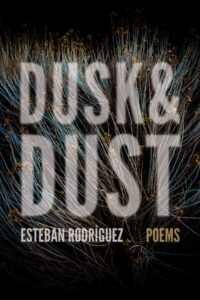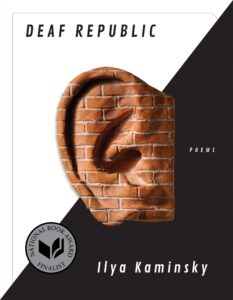Poetry! Poetry is what’s new at the A.K. Smiley Library.
Poetry has had a bit of a resurgence lately and brings with it the ability to convey ever broadening ideas within an ever-changing art form. The great thing about poetry is that it gives voices to those who may go unheard and gives us, the readers, a chance to interact with those voices. This latest batch all centralize on the theme of being an outsider, trying to find a place within a society that while requiring their presence, wants that presence to be as small as possible. It requires loyalty with invisibility. These works call into question the results of that type of society and shows that such a way of existing fails all of us.
 Felon:Poems by Reginald Dwayne Betts is a work concentrating on the life and experiences of a formerly incarcerated person. The work speaks to the struggles of a system that is seemingly unbalanced and unfair while striving to accept one’s own responsibility and actions. Betts uses found poetry created from case files to describe the unfairness of the bond system and how difficult it is to rejoin society once the brand of “felon” has been put upon you. Not only that, but those acquainted with the “felon” can also become ostracized from society and forced to carry the burden regardless of culpability. Immensely moving and devastating in its prose, this work questions how fair it is to continuously punish those after they have already paid their dues.
Felon:Poems by Reginald Dwayne Betts is a work concentrating on the life and experiences of a formerly incarcerated person. The work speaks to the struggles of a system that is seemingly unbalanced and unfair while striving to accept one’s own responsibility and actions. Betts uses found poetry created from case files to describe the unfairness of the bond system and how difficult it is to rejoin society once the brand of “felon” has been put upon you. Not only that, but those acquainted with the “felon” can also become ostracized from society and forced to carry the burden regardless of culpability. Immensely moving and devastating in its prose, this work questions how fair it is to continuously punish those after they have already paid their dues.
 Everything Must Go: the Life and Death of an American Neighborhood by Kevin Coval, with illustrations by Langston Allston, works to show the desolation caused by the loss of a neighborhood. The idea is turned on its head by showing that the great American neighborhood is not always what we think. Pulling on his own experiences in the Wicker Park neighborhood of Chicago before and after gentrification, Coval shows how the identity of a place is made up of so many different people and how this loss of otherness is detrimental to society as a whole. How those that create a neighborhood are often pushed out and how can that neighborhood stand without the heart that was lost. Coval acknowledges his own role in the process of gentrification and seeks to find his place between what was there before and what has resulted.
Everything Must Go: the Life and Death of an American Neighborhood by Kevin Coval, with illustrations by Langston Allston, works to show the desolation caused by the loss of a neighborhood. The idea is turned on its head by showing that the great American neighborhood is not always what we think. Pulling on his own experiences in the Wicker Park neighborhood of Chicago before and after gentrification, Coval shows how the identity of a place is made up of so many different people and how this loss of otherness is detrimental to society as a whole. How those that create a neighborhood are often pushed out and how can that neighborhood stand without the heart that was lost. Coval acknowledges his own role in the process of gentrification and seeks to find his place between what was there before and what has resulted.
 Dusk & Dust by Esteban Rodriquez, describes the life of a young boy discovering his otherness within both his family and society as a whole. The work tells the story of the child of immigrant parents who want a better life for him even at the cost of estrangement with those of his own culture. It even refers to him at one point, as the boy from “el otra lado”, or the boy from the other side. Rodriquez sees himself as someone lost between the two while trying to reconcile both. This work captures the essence of existing in two spheres of identity but belonging to neither.
Dusk & Dust by Esteban Rodriquez, describes the life of a young boy discovering his otherness within both his family and society as a whole. The work tells the story of the child of immigrant parents who want a better life for him even at the cost of estrangement with those of his own culture. It even refers to him at one point, as the boy from “el otra lado”, or the boy from the other side. Rodriquez sees himself as someone lost between the two while trying to reconcile both. This work captures the essence of existing in two spheres of identity but belonging to neither.
 Deaf republic: Poems by Ilya Kaminsky works with the idea of society in a different way. Working with an imaginary town, Kaminsky creates a dialogue in which a factitious town falls deaf after the murder of a deaf boy by soldiers. The work postulates what happens to a society if we refuse to listen to what one another has say. The work focuses on our lack of hearing the voices we need to hear the most and is bookended with poems which question whether or not we in our society are deaf to those who need our help.
Deaf republic: Poems by Ilya Kaminsky works with the idea of society in a different way. Working with an imaginary town, Kaminsky creates a dialogue in which a factitious town falls deaf after the murder of a deaf boy by soldiers. The work postulates what happens to a society if we refuse to listen to what one another has say. The work focuses on our lack of hearing the voices we need to hear the most and is bookended with poems which question whether or not we in our society are deaf to those who need our help.
Each of these works brings us to the question of who makes up our society and do we listen to what they have to say. Give these books a chance and just maybe we all will be a bit closer to answering that question.